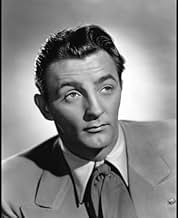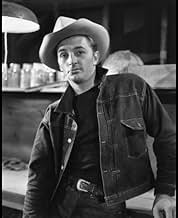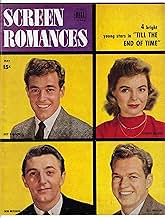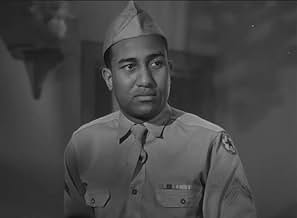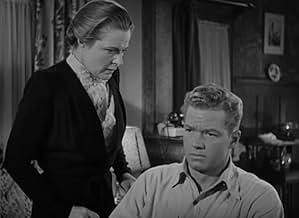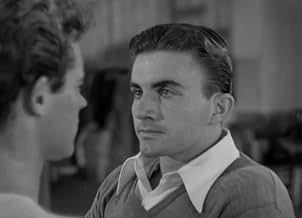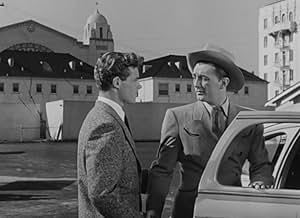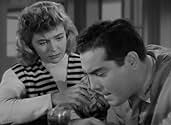IMDb RATING
6.7/10
1.7K
YOUR RATING
Drama about former WW2 Marines readjusting to civilian life and dealing with their mental and physical traumas.Drama about former WW2 Marines readjusting to civilian life and dealing with their mental and physical traumas.Drama about former WW2 Marines readjusting to civilian life and dealing with their mental and physical traumas.
- Awards
- 4 wins total
Harry von Zell
- Scuffy
- (as Harry Von Zell)
John Bailey
- Interviewer
- (uncredited)
Bobby Barber
- Arcade Game Player in Saloon
- (uncredited)
Bill Barnum
- Jackson
- (uncredited)
Dick Benjamin
- Sergeant
- (uncredited)
Paul Birch
- Marine Wanting Farm
- (uncredited)
- Director
- Writers
- All cast & crew
- Production, box office & more at IMDbPro
Featured reviews
Dorothy McGuire's performance (as Pat Ruscomb, war widow) is exceptionally good in this film. She is so convincing that viewers need focus on the effects of World War II on the war widows as much as the effects on returning servicemen. Despite her plight, she is the character that holds the film together when all else is chaos. One can only wonder how many women were left in like situations after the war. Where "The Best Years of Our Lives" adequately portrays the problems of readjustments of soldiers to civilian life, this film gives us a look at the sinister effect on those who remained on the home front. The scars on women, families, and homes do extend "till the end of time."
No need to repeat the plot. That scene where Pat (McGuire) and Cliff (Madison) encounter the shell-shocked outpatient is genuinely disturbing. For a screenplay, that's a tough problem to treat in a single set-up. Pat's little anecdotal lesson works pretty well-- the soldier is relieved of his demons for the moment. But for how long, I wonder. And what will become of him, sitting alone, quaking, and afraid to go home. And how many others will come home like him. The script says the inner wounds will wear off eventually, but then it had to say something like that, otherwise the movie's hopeful tone would be compromised. And that would be counter to what the country needs following four years of horror.
It' a decent, earnest movie, produced by the studio's (RKO) head honcho Dore Schary, so it's a prestige production. Looks like they took a gamble on an unknown Guy Madison in the lead role. He certainly looks the part—I can just about hear the echoing squeals of bobby- soxers even 60 years later. He does bring an earnestness that's refreshing, even if his range is pretty limited as the heavier scenes show. Newcomers Mitchum and the underrated Bill Williams also register, along with the dewy-eyed Dorothy McGuire before she became a favorite movie mom. But I especially like Jean Porter's vivacious teenager. It's really her Helen who projects the buoyant spirit of the coming consumer age.
There were, of course, a number of these "adjustment" films as the country struggled with a return to normalcy. Where this movie excels is with the uncertainty of a recovering civilian world. Each main character is drifting as a result of the war. Each has been changed and must now work out how to fit back in. Then too, I like the rather ambivalent way the movie ends, avoiding easy solutions.
There's one other sequence worth noting. The barroom brawl is both over-done and clumsily staged. Nonetheless, it makes an important point. Namely, that the war has changed society as well as individuals. A post-war America will be more inclusive than the traditional America. The logic appears to be that since it took everyone to win the war, no one should be excluded from the fruits. Given the civil rights movement soon to emerge, the movie thus proves prophetic. Too bad this worthy movie effort now seems so obscure. Despite the years, it remains an affecting look at a key period in American life and merits catching up with.
(In passing—that's filmmaker Blake Edwards of Pink Panther fame as the shop foreman that Cliff tangles with, soon to become a screenwriter, and then an A-picture producer-director.)
It' a decent, earnest movie, produced by the studio's (RKO) head honcho Dore Schary, so it's a prestige production. Looks like they took a gamble on an unknown Guy Madison in the lead role. He certainly looks the part—I can just about hear the echoing squeals of bobby- soxers even 60 years later. He does bring an earnestness that's refreshing, even if his range is pretty limited as the heavier scenes show. Newcomers Mitchum and the underrated Bill Williams also register, along with the dewy-eyed Dorothy McGuire before she became a favorite movie mom. But I especially like Jean Porter's vivacious teenager. It's really her Helen who projects the buoyant spirit of the coming consumer age.
There were, of course, a number of these "adjustment" films as the country struggled with a return to normalcy. Where this movie excels is with the uncertainty of a recovering civilian world. Each main character is drifting as a result of the war. Each has been changed and must now work out how to fit back in. Then too, I like the rather ambivalent way the movie ends, avoiding easy solutions.
There's one other sequence worth noting. The barroom brawl is both over-done and clumsily staged. Nonetheless, it makes an important point. Namely, that the war has changed society as well as individuals. A post-war America will be more inclusive than the traditional America. The logic appears to be that since it took everyone to win the war, no one should be excluded from the fruits. Given the civil rights movement soon to emerge, the movie thus proves prophetic. Too bad this worthy movie effort now seems so obscure. Despite the years, it remains an affecting look at a key period in American life and merits catching up with.
(In passing—that's filmmaker Blake Edwards of Pink Panther fame as the shop foreman that Cliff tangles with, soon to become a screenwriter, and then an A-picture producer-director.)
The year after World War II ended brought the first dramas to look at the plight of returning veterans trying to readjust to civilian norms. The Best Years of Our Lives was the big hit that year, but there were others, too. The title song in Till The End of Time, which was adapted from a Chopin polonaise, snakes through the movie wearing many skins, from saraband to Swing, constituting one of the more effective leitmotifs of 40s-movie scores. The story centers on Guy Madison, returning from the Pacific to his Los Angeles family. His parents expect the boy who left, not the man (physically, at least) who came back; they recoil when he wants to share his experiences in battle. So he starts to rebel against their sheltered and complacent life but has little idea of what to do with his own.
His love life is riven as well. One the one side there's the brash bobby-soxer next door, symbolizing what he used to be; on the other is weary war-widow Dorothy McGuire (among her most affecting roles), another survivor of the horrors of combat.
It's tempting to assume that Madison landed this meaty role (he's constantly on screen) solely because of his looks -- extraordinary, even by Hollywood standards. But he delivers a natural, if a bit bashful, performance. Only when buddy Robert Mitchum resurfaces halfway through the movie does he suffer by comparison. As a black sheep with a steel plate in his skull, Mitchum strikes the sparks that would ignite his long stardom; Madison, while pleasant and competent, comes up with nothing new and starts to grow monotonous (his career took him to TV westerns and European cheapies).
Director Edward Dmytryk (Murder, My Sweet; Back to Bataan) tones down for this leisurely character study, which remains absorbing and at times close to moving. He missteps once, very near the end, when a blast at bigotry comes flying out of left field, and he probably had to settle for the upbeat ending the studio wanted. But it was left to film noir, which dealt with similar issues obliquely (Blue Dahlia, Act of Violence, Dmytryk's own Crossfire) that probed them more profoundly.
His love life is riven as well. One the one side there's the brash bobby-soxer next door, symbolizing what he used to be; on the other is weary war-widow Dorothy McGuire (among her most affecting roles), another survivor of the horrors of combat.
It's tempting to assume that Madison landed this meaty role (he's constantly on screen) solely because of his looks -- extraordinary, even by Hollywood standards. But he delivers a natural, if a bit bashful, performance. Only when buddy Robert Mitchum resurfaces halfway through the movie does he suffer by comparison. As a black sheep with a steel plate in his skull, Mitchum strikes the sparks that would ignite his long stardom; Madison, while pleasant and competent, comes up with nothing new and starts to grow monotonous (his career took him to TV westerns and European cheapies).
Director Edward Dmytryk (Murder, My Sweet; Back to Bataan) tones down for this leisurely character study, which remains absorbing and at times close to moving. He missteps once, very near the end, when a blast at bigotry comes flying out of left field, and he probably had to settle for the upbeat ending the studio wanted. But it was left to film noir, which dealt with similar issues obliquely (Blue Dahlia, Act of Violence, Dmytryk's own Crossfire) that probed them more profoundly.
Though Till The End Of Time boasted a hit song which filled the radio airwaves for months after the film was released, seen today it looks a whole lot like a dress rehearsal for The Best Years Of Our Lives. Not that it is a bad film, but Sam Goldwyn did so much better with a very similar plot involving three returning war veterans.
In this case we're talking Marines, veterans of the Pacific Theater who have just come home and are trying to readjust to civilian life. At least Guy Madison is all in one piece. He meets up with attractive war widow Dorothy McGuire who's having a much harder time. Her late husband was a flier, the glamor job of the service and just about anyone else doesn't measure up. But Madison has one advantage, he's alive and McGuire is not getting any younger.
Till The End Of Time was a followup film for Robert Mitchum who had just had his breakthrough role in The Story Of GI Joe. He plays Madison's best friend, the cowboy of Kwajalein, who talks about getting enough money together for a chicken ranch in New Mexico, but just can't quite get around to ending the partying from being discharged. Mitchum got the most notice from this film and this cemented his number one status at RKO for years.
Like The Best Years Of Our Lives this film dealt with three veterans and the third is Bill Williams, later television's Kit Carson, who is a double amputee. Not much call for prize fighters which he was before the war with no legs. Selena Royle is particularly touching in her role as Williams's mother.
The acclaim this film got was drowned out by the Goldwyn masterpiece which ironically enough was also released by RKO. But besides Mitchum's performance, the title theme from this picture was a big record hit in 1946. Adapted from Chopin's Polonaise by Ted Mossman and Buddy Kaye, Till The End Of Time gave Perry Como one of his earliest gold records just as he was breaking out as a singer. Doris Day also had a big seller with the Les Brown band.
A lot of the plot elements from The Best Years Of Our Lives are found in this film. Served up nicely, but not quite the same flavor, still tasty though.
In this case we're talking Marines, veterans of the Pacific Theater who have just come home and are trying to readjust to civilian life. At least Guy Madison is all in one piece. He meets up with attractive war widow Dorothy McGuire who's having a much harder time. Her late husband was a flier, the glamor job of the service and just about anyone else doesn't measure up. But Madison has one advantage, he's alive and McGuire is not getting any younger.
Till The End Of Time was a followup film for Robert Mitchum who had just had his breakthrough role in The Story Of GI Joe. He plays Madison's best friend, the cowboy of Kwajalein, who talks about getting enough money together for a chicken ranch in New Mexico, but just can't quite get around to ending the partying from being discharged. Mitchum got the most notice from this film and this cemented his number one status at RKO for years.
Like The Best Years Of Our Lives this film dealt with three veterans and the third is Bill Williams, later television's Kit Carson, who is a double amputee. Not much call for prize fighters which he was before the war with no legs. Selena Royle is particularly touching in her role as Williams's mother.
The acclaim this film got was drowned out by the Goldwyn masterpiece which ironically enough was also released by RKO. But besides Mitchum's performance, the title theme from this picture was a big record hit in 1946. Adapted from Chopin's Polonaise by Ted Mossman and Buddy Kaye, Till The End Of Time gave Perry Como one of his earliest gold records just as he was breaking out as a singer. Doris Day also had a big seller with the Les Brown band.
A lot of the plot elements from The Best Years Of Our Lives are found in this film. Served up nicely, but not quite the same flavor, still tasty though.
I picked this up for $5 at a sale just because it had Robert Mitchum's name on the credits. Mitchum's role is secondary but I found I enjoyed the movie rather more than I thought I would.
I understand it was released the same year as THE BEST YEARS OF OUR LIVES and was rather over shadowed by that more expensive production.
The theme is dated, servicemen adjusting to civilian life after WW2, it is basically a soap opera but it very well handled by director Edward Dmytryk. Chopin's music is cleverly interwoven throughout, as background music, as a popular song with lyrics added heard over the radio and even jazzed up in a barroom sequence.
Performances are good. Guy Madison is no great shakes as an actor but he looks the part, give an honest performance and doesn't bump into the furniture. Dorothy Mcguire has always been a favorite of mine. Usually she played dowdy housewives but she had a neat figure and to me she had a down to earth sex appeal.
Well worth seeing.
I understand it was released the same year as THE BEST YEARS OF OUR LIVES and was rather over shadowed by that more expensive production.
The theme is dated, servicemen adjusting to civilian life after WW2, it is basically a soap opera but it very well handled by director Edward Dmytryk. Chopin's music is cleverly interwoven throughout, as background music, as a popular song with lyrics added heard over the radio and even jazzed up in a barroom sequence.
Performances are good. Guy Madison is no great shakes as an actor but he looks the part, give an honest performance and doesn't bump into the furniture. Dorothy Mcguire has always been a favorite of mine. Usually she played dowdy housewives but she had a neat figure and to me she had a down to earth sex appeal.
Well worth seeing.
Did you know
- TriviaJean Porter and Edward Dmytryk met during the making of this film and would be married in 1948, until his death in 1999.
- GoofsOn the bus arriving at the Marine base at the beginning, California is misspelled "Caliornia."
- Quotes
Cliff Harper: We parted company when he was dumb enough to get shot!
William Tabeshaw: Why don't you own up,Harper? I was a big hero and you were a coward!
- ConnectionsFeatured in Hollywood the Golden Years: The RKO Story: Dark Victory (1987)
- SoundtracksTill the End of Time
by Buddy Kaye and Ted Mossman, based on Chopin's "Polonaise"
Music by Frédéric Chopin (uncredited)
Everything New on HBO Max in August
Everything New on HBO Max in August
Looking for something different to add to your Watchlist? Take a peek at what movies and TV shows are coming to HBO Max this month.
- How long is Till the End of Time?Powered by Alexa
Details
- Release date
- Country of origin
- Language
- Also known as
- Hasta el fin del tiempo
- Filming locations
- Production companies
- See more company credits at IMDbPro
- Runtime
- 1h 45m(105 min)
- Color
- Aspect ratio
- 1.37 : 1
Contribute to this page
Suggest an edit or add missing content

